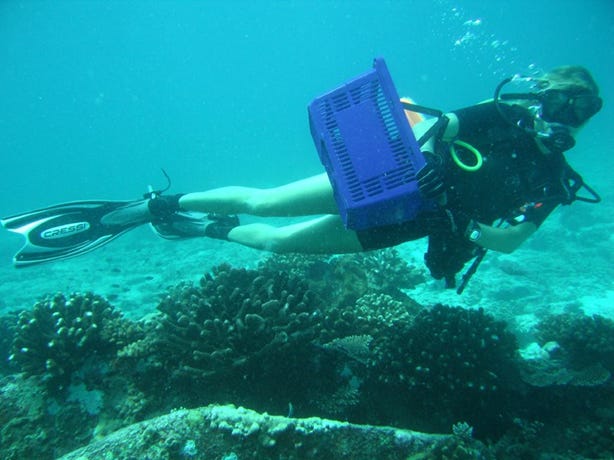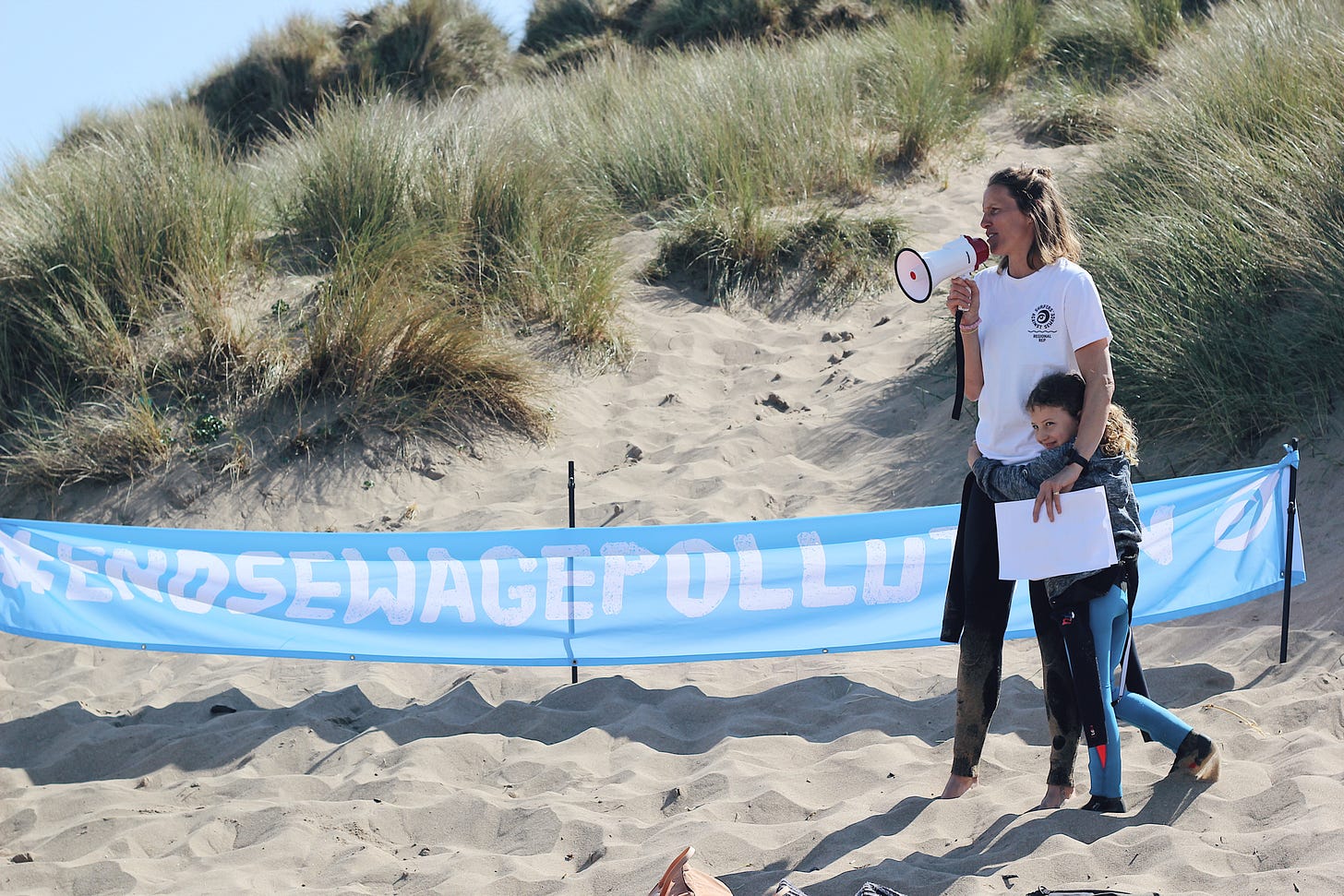“Young people don’t understand how to affect change in their community.”
An interview with surfer, marine scientist and anti-plastic campaigner Claire Moodie from North Devon
“Citizenship is massive. Young people don’t really understand how to affect change in their community, how the structures of local districts, councils, and governments work, and they feel very disengaged. We want to help them learn how to leverage their communities and use their voices effectively.”
I love surfing in North Devon – it’s a special, nature-rich coastline and I head down there with the family as often as I can. I’m always interested in chatting to local environmental and inclusivity champions, such as former interviewee Yvette Curtis, and Adam Hall, who helped the area become the UK’s first World Surfing Reserve.
So, I was super excited to speak to Claire Moodie, co-founder and CEO of Plastic Free North Devon, an awesome local organisation, which champions environmental protection through community-led action. We talk about how her relationship with water steered her career path, the menace of plastic tat on beaches and the importance of engaging young people. Enjoy!
Hey Claire, how’s the surf?
It’s been pretty flat and a bit windy, but a few weeks ago I was in quite a bit, which was really nice. I spend most of my time surfing at Croyde but if it’s small and fun I’ll go to Saunton with a longboard.
Did surfing inspire you to set up Plastic Free North Devon?
My relationship with water definitely. I spent so much time in the water growing up and being outdoors and I studied marine geography at university in the hope that would lead me to decent jobs where I could be outside and underwater a lot of the time.
I worked on environmental conservation projects and then offshore doing environmental surveys for offshore windfarms and pipeline routes as it was well paid instead of working for free, but I decided it wasn’t for me after a while.
My first paid conservation job was working as an underwater gardener in the Seychelles – it was one of the first coral restoration projects, where we’d grow coral in these big underwater nurseries and then replant it in areas that had been destroyed by coral bleaching.
But I wanted to be back in North Devon, having the lifestyle I wanted, while doing environmental work, so I applied to do my teacher training in geography. I was volunteering as a rep for Surfers Against Sewage and doing volunteer work for the North Devon biosphere but then I got pregnant in my PGSE year and during my maternity leave in 2017, I set up Plastic Free North Devon as a community group with some others. And as we got some funding from the Pickwell Foundation I didn’t go back to teaching.
Was that around the time of Blue Planet II when public awareness of ocean plastic pollution was rising?
Yes exactly, I’m pretty sure the series came out just before we had our big launch, and there was a huge rise in public awareness around the issue, with people linking plastic use directly to their daily lives and how they’re affecting the natural world.
It’s still a really important issue in terms of opening those gates and then when you get people on that kind of journey you can start talking to them about other environmental issues – it’s a game changer.
It really annoys me how so many beach-based businesses in Brighton & Hove still sell drinks in single-use plastic cups…
Certain single use plastics are now outlawed and you can report businesses who break the law to trading standards.
We’ve also developed a sustainable business resource programme to help businesses go deeper than just single use plastic, whether that’s about their waste streams or how they talk to their employees. We charge just enough to cover our costs, it’s not thousands of pounds as it would be with a professional consultancy.
What type of businesses do you mostly work with?
At the beginning, we were only touching tourist businesses, cafes and restaurants and not going into the main industrial centres in Barnstaple, and Bideford, but we knew we needed to talk to businesses there, as that was where quite a lot of the impact in the region was coming from.
If you find surfers and other people who love the outdoors in those businesses, does it help kickstart these conversations?
Definitely, if you’ve got someone who cares about these issues, at least they can put that idea on the table, instead of banging on a closed door. Though it’s also dependent on the role they have in that business.
Creating change is really about individuals being connected with the problems and understanding that their business has the potential to make quite a big impact.
We get six million visitors here every year and it’s of course good if visitors can carry a message away with them when they go back home. But there is still so much work to do in North Devon in terms of businesses. We’re right by Tesco and the magazine aisle is still full of 20 different children’s magazines that have 20 different types of plastic toys on the front. And fruit and veg is still wrapped in plastic. You can see big changes have been made in terms of packaging that big corporations can shout about when they add up their collective impact but when you look at it on the surface it still feels minimal, which is a challenge.
Like that guy who sells plastic beach tat just outside of the Ruda campsite in Croyde…
One of our main campaigns a couple of years ago was trying to get the flimsy foam bellyboards banned. I haven’t seen anyone selling those for a long time, but they still sell the slightly bigger ones. And him being able to set up there just shows a massive failure in the ability of the local council to not be able to get rid of someone who’s on double yellow lines all day long and is able to sell complete shit when you have all the businesses around working quite hard to not do that.
That said, he is only selling what every other supermarket and some other tourist shops sell. If the legislation was there to stop some of the poor quality products being sold and we had a better, more circular model in place, he wouldn't be able to do it. We so often tackle each other and miss the opportunity to tackle the system that has allowed this crisis in the first place.
I feel Ruda does a good job generally, though there is a lot of plastic tat in the arcade…
There is so much work to do on all of that. Ruda itself has a beach ranger team, and they take the kids out on the beach as mini explorers in the summer. But I did a beach clean last Friday, and we found a lot of plastic tags from clothes, including quite a few from their shop. Last year the rangers got the shop workers to cut the tags out.
Parkdean, who own Ruda, support what we do. They helped us rent a minibus for a whole year so we could run our education programme and support schools with transport, which was a real game changer, but you have to have a top down approach across the business.
Is the answer for us as consumers to do better?
Yes, but I think so much is put on the consumer to do the right thing and it’s hard for parents to say no to the 15p plastic buckets or magazines with plastic on the covers,
From a Plastic Free North Devon point of view, we try to facilitate behavioural change, for example by having those toy sheds on the beach, so you don’t have to buy the cheap bucket, you’ve got a better alternative.
And we work with three secondary schools, looking at what we’re trying to achieve with our young people when they leave school, from an environmental and societal values point of view, what actions are they taking, what are their shopping behaviours and societal responses as well.
Citizenship is massive. Young people don’t really understand how to affect change in their community, how the structures of local districts, councils, and governments work, and they feel very disengaged. We want to help them learn how to leverage their communities and use their voices effectively.
Has being in a coastal environment like North Devon helped mobilise people do you think?
Yes but we can’t just have environmental protection as an add on. It has to be woven into every aspect of community groups and businesses and there is a real lack of that at the moment.
We’ve started to pilot something with our local surf lifesaving clubs. They have their four or five year strategies, but these don’t mention the environment. So how do you intertwine it for these clubs, which are happening on the beach three-four nights a week in the summer? They have so many members, and this whole melting pot of people who are all engaging with the sea. How do you start linking that to the fact that the oceans are in trouble and all the things you can do to support it.
Because actually being a part of this club means you are supporting it because your club is doing things to support it. And hopefully that trickles up to Surf Lifesaving GB.
The plans we’ve written for our two local lifesaving clubs range from, who they bank with, to doing beach cleans after each event and an environmental audit at the end of the year, to tracking who is cycling and who is car sharing.
We’re piloting it for surf lifesaving clubs at the moment but hoping we’ll get some feedback towards the end of the year and work out whether we can try and roll it out to other clubs in the area, such as football, running, rugby, and netball clubs.
We also do quite a lot of support with events. We designed a water bar three or four years ago, which we started taking to events to stop the sale of water bottles, and we loan out reusable cups.
Do you have much pushback locally?
Not really, we’re pretty well supported. Our approach tends to be quite collaborative, and gentle and friendly, and that seems to work with local councillors and local people, which is great.
Head here for more info on Plastic Free North Devon.
And here’s a piece I did for Huck on how North Devon became the UK’s first World Surfing Reserve.
As ever, please fwd this newsletter to anyone who you think might be interested & if you have any story tips on any of these themes pls get in touch.
Also, just to say, all my interviews (bar one at the start) are done with long video calls or face to face chats and I spend a good amount of time editing them. If you value my work and can afford to, pls do support the newsletter by becoming a paid subscriber & big thanks to those of you who already are xx








